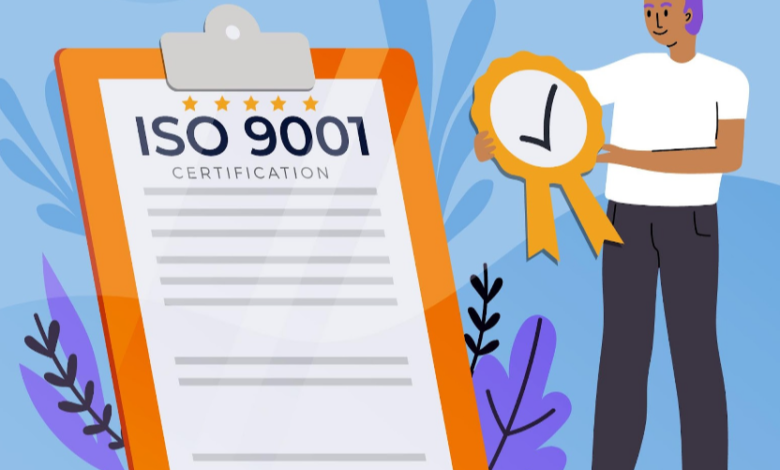What is ISO 9001 Quality Management Software and How Does It Improve Business Operations?

In today’s competitive landscape, businesses are constantly seeking tools to improve quality, streamline operations, and enhance customer satisfaction. ISO 9001 Quality Management Software plays a critical role in these efforts by helping businesses standardize their processes and achieve continuous improvement. Let’s dive into what ISO 9001 quality management software is, how it supports effective business operations, and why it’s essential for any organization aiming to excel in quality and efficiency.
Understanding ISO 9001 and Quality Management Software (QMS)
What is ISO 9001?
ISO 9001 is an internationally recognized standard for quality management systems, providing businesses with a framework for achieving consistent quality in products and services. It was developed by the International Organization for Standardization (ISO) and is used worldwide to establish reliable business practices.
ISO 9001 Full Form and Significance
The full form of ISO 9001 stands for the “International Organization for Standardization, Quality Management System 9001.” The standard is popular across industries due to its proven ability to help organizations meet customer needs, reduce errors, and boost operational efficiency.
What is QMS Full Form and Purpose?
QMS stands for Quality Management System. A QMS, particularly one based on ISO 9001, is designed to help organizations manage and improve quality at every step of their operations. By implementing QMS software, businesses can streamline documentation, automate quality control processes, and make data-driven improvements.
Key Components of ISO 9001 Quality Management Software
Document Control
Effective document control is essential for ISO 9001 compliance. QMS software helps businesses organize, update, and manage documents like procedures, manuals, and records, ensuring that all employees access the latest information.
Non-Conformance and Corrective Actions
ISO 9001 emphasizes identifying and addressing non-conformities. QMS software provides tools to record issues, assign corrective actions, and monitor the resolution process, preventing recurrence and driving continuous improvement.
Customer Satisfaction and Feedback
Customer satisfaction is a core goal of ISO 9001. By incorporating customer feedback, QMS software helps businesses assess performance and implement changes based on real insights from their audience.
Audit Management
Auditing is an integral part of maintaining compliance. QMS software assists in scheduling, conducting, and reviewing internal audits, which helps organizations maintain a high standard of quality.
Benefits of ISO 9001 Quality Management Software for Businesses
Streamlined Processes and Efficiency
ISO 9001 quality management software automates routine tasks, minimizes manual errors, and standardizes processes, leading to smoother operations and better time management.
Enhanced Customer Satisfaction
With a focus on quality, companies can meet customer expectations more consistently. Satisfied customers are more likely to return, recommend, and remain loyal to the brand.
Improved Risk Management
QMS software provides tools to identify, assess, and mitigate risks before they impact operations, which enhances the company’s ability to deliver consistent quality.
How ISO 9001 QMS Software Enhances Business Operations
Standardization Across Processes
QMS software helps organizations implement ISO 9001 standards consistently, which leads to standardized procedures across departments, reducing variations and ensuring reliability.
Data-Driven Decision Making
By collecting data on performance, non-conformities, and customer feedback, QMS software supports better decision-making, allowing businesses to take actions backed by facts and trends.
Employee Involvement and Training
Employees are critical to quality management success. QMS software often includes training modules that help staff stay updated on best practices and participate actively in maintaining high standards.
How to Choose the Right ISO 9001 Quality Management Software
Identifying Business Needs
Determine what specific functions your business requires from QMS software, such as document control, customer feedback, or audit tracking, to find a solution that meets your operational needs.
Evaluating Features and Usability
An intuitive and easy-to-navigate software is essential. Evaluate features and usability to ensure the software will be accessible and practical for your team.
Scalability and Flexibility
Choose QMS software that can grow with your business and adapt to changing requirements, such as industry regulations or process changes.
Implementing ISO 9001 QMS Software Successfully
Staff Training and Engagement
Training is essential for effective software implementation. Make sure all relevant team members understand how to use the QMS software and its importance in daily operations.
Setting Up Key Performance Indicators (KPIs)
KPIs are essential to measure the success of your QMS software implementation. Common KPIs include customer satisfaction scores, defect rates, and audit performance.
Regular Audits and Continuous Improvement
Audits should be conducted regularly to ensure the QMS software is helping the business meet ISO 9001 standards and drive continuous improvement.
Common Challenges and Solutions When Adopting ISO 9001 QMS Software
Implementing QMS software may face hurdles such as resistance to change or adapting to new workflows. Solutions include ongoing training, clear communication of benefits, and gradually integrating the software into daily routines.
Read more: Expand Your Website’s Global Impact with Professional Localization Services
The Future of ISO 9001 Quality Management Software
As technology advances, we can expect QMS software to become more automated and integrated with AI, improving predictive quality control and enhancing data analytics for even more proactive decision-making.
Conclusion
ISO 9001 quality management software is a vital asset for any business committed to quality. By providing the structure to standardize processes, manage risks, and ensure customer satisfaction, QMS software not only improves operational efficiency but also builds trust and credibility. Adopting ISO 9001 QMS software is an investment in excellence and customer loyalty that can propel businesses toward long-term success.
FAQs
What is the ISO 9001 certification process?
The ISO 9001 certification process involves a series of steps where an organization develops, documents, and implements a quality management system that meets ISO 9001 standards, followed by an external audit to verify compliance.
How does ISO 9001 software differ from other quality management tools?
ISO 9001 software is specifically designed to meet ISO 9001 requirements, focusing on standardization, process control, and customer satisfaction, whereas other tools may not offer these specific capabilities.
Can small businesses benefit from ISO 9001 QMS software?
Absolutely. ISO 9001 QMS software helps small businesses streamline processes, improve product quality, and enhance customer satisfaction, all of which are essential for growth.
How long does it take to implement ISO 9001 QMS software?
Implementation time varies based on company size and readiness, but typically, it can take anywhere from a few weeks to several months.
Does ISO 9001 guarantee improved product quality?
While ISO 9001 focuses on process quality and management practices, it doesn’t guarantee product quality but rather ensures a framework for consistently achieving it.




